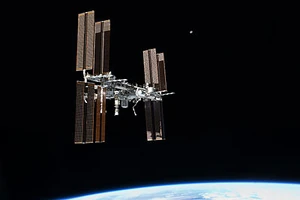A space station, also known as an orbital station or an orbital space station, is a spacecraft capable of supporting a crew, which is designed to remain in space (most commonly in low Earth orbit) for an extended period of time and for other spacecraft to dock. These are terrible places to hold up in even if someone had the chance to.
Advantages[]
- Space stations will remain zombie-free at all times, there's no doubt about it.
- Space stations are also nearly impossible to raid.
- Space stations have their own life support systems and power sources (solar panels).
- Water purification is standard on space stations.
- Always equipped with spacecraft (like the Soyuz) acting as lifeboats.
Disadvantages[]

The International Space Station
- Chances of actually having even the slightest of chances to go up to a space station is next to impossible, due to very high costs or training requirements.
- Without proper training, survivors will surely die of many reasons other than zombies, like exposure to the cold vacuum of space.
- Hardly anyone knows how to get into orbit, let alone dock with a station. Spaceships and rockets are far harder to fly properly than aircraft.
- Space stations can´t be in orbit around Earth forever. Without fuel, the tiny amount drag exerted by the upper atmosphere will cause it to deorbit in months or years.
- Zero gravity causes people to get weaker. Astronauts returning from the ISS after being up there for a few months cannot walk for days to weeks. Unless you happened to be extremely lucky and have other survivors find and save you, you will be eaten within hours at best.
- It would be very hard to land within a thousand kilometers of where you want to on the planet, let alone within eyesight of it.
- Space stations require regular replenishment of supplies and parts from the planet, and although efficient, cannot sustain themselves.
- Radiation is a concern if survivors managed to stay alive on board for years, as the upper atmosphere has far higher radiation levels than at the planet's sea level.
